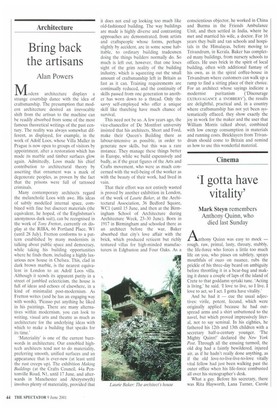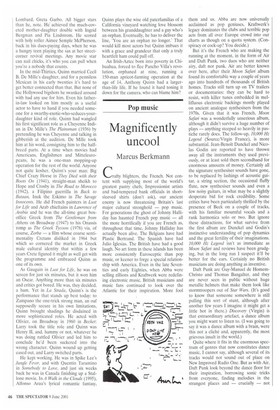'I gotta have vitality'
Mark Steyn remembers Anthony Quinn, who died last Sunday
Anthony Quinn was easy to mock — rough, raw, primal, lusty, throaty, stubbly, the life-force who forces a little too much life on you, who pisses on subtlety, sprays mouthfuls of ouzo on nuance, rubs the prickle of his three-day beard on ambiguity before throttling it in a bear-hug and making it dance a couple of laps of the island of Crete to that goddamn syrtaki tune. 'Acting is living,' he said. 'I love to live, so I live. I love to act, so I act. I gotta have vitality.'
And he had it — cue the usual adjectives: virile, potent, fecund, which were originally applied because he had outspread arms and a shirt unbuttoned to the navel, but which proved impressively literal, not to say seminal. In his eighties, he fathered his 12th and 13th children with a secretary half-a-century younger. 'The Mighty Quinn!' declared the New York Post. Through all the ensuing turmoil, the old dog had a faintly bewildered, injured air, as if he hadn't really done anything, as if the old love-to-live-live-to-love vitally vital fellow had just been walking past the outer office when his life-force combusted all over his stenographer's desk.
What a guy. Before his secretary, there was Rita Hayworth, Lana Turner, Carole Lombard, Greta Garbo. All bigger stars than he, note. He achieved the much-coveted mother-daughter double with Ingrid Bergman and Pia Lindstrom. He scored with holy roller Aimee Semple McPherson, back in his dues-paying days, when he was a hungry teen playing the sax at her streetcorner revival meetings. Any movie star can nail chicks, it's who you can pull when you're a nobody that counts.
In the mid-Thirties, Quinn married Cecil B. De Mille's daughter, and for a penniless Mexican in his early twenties it's hard to get better connected than that. But none of the Hollywood bigshots he swanked around with had any use for him. Even his fatherin-law looked on him mostly as a useful actor to have to hand if you needed someone for a swarthy-exotic-who-seduces-yourdaughter kind of role. Quinn had wangled his first significant role as a Cheyenne Indian in De Mille's The Plainsman (1936) by pretending he was Cheyenne and talking in gibberish at the audition. De Mille took him at his word, consigning him to the halfbreed parts. At a time when movies had Americans, Englishmen and Mitteleuropeans, he was a one-man mopping-up operation for the rest of the world. Anyone not quite kosher, Quinn's your man: Big Chief Crazy Horse in They Died with their Boots On (1941), straight-man sheikh to Hope and Crosby in The Road to Morocco (1942), a Filipino guerrilla in Back to Bataan, Inuk the Eskimo in The Savage Innocents. He did French painters in Lust for Life and Arab chieftains in Lawrence of Arabia and he was the all-time great boxoffice Greek from The Gentleman from Athens on Broadway (1947) to his Onassis romp as The Greek Tycoon (1978) via, of course, Zorba — a film whose coarse sentimentality Cretans disliked in 1964 but which so cornered the market in Greek male cultural identity that within a few years Crete figured it might as well get with the programme and embraced Quinn as one of its own.
As Gauguin in Lust for Life, he was on screen for just six minutes, but it won him an Oscar. Anything more than six minutes and critics got bored. He was, they decided, a ham. Yet in La Strada, Quinn's is the performance that stands up best today: to Zampano the one-trick strong man, an oaf supposedly secure in his own limitations, Quinn brought shadings he disdained in more sophisticated roles. He acted with Olivier, on Broadway in 1960 in Becket: Larry took the title role and Quinn was Henry II, and, hammy or not, whatever he was doing rattled Olivier and led him to conclude he'd been suckered into the wrong character. Quinn wound up getting eased out, and Larry switched parts.
He kept working. He was in Spike Lee's Jungle Fever, and with Quentin Tarantino in Somebody to Love, and just six weeks back he was in Canada finishing up a Stallone movie. In A Walk in the Clouds (1995), Alfonso Arau's lyrical romantic fantasy,
Quinn plays the wise old paterfamilias of a California vineyard watching love blossom between his granddaughter and a guy who's an orphan. Eventually, he has to deliver the line, 'You are an orphan no longer.' That would kill most actors but Quinn imbues it with a grace and grandeur that only a truly heartfelt ham could pull off.
An Irish-Aztec born into poverty in Chihuahua, forced to flee Pancho Villa's revolution, orphaned at nine, running a 150-man apricot-farming operation at the age of 14, Anthony Quinn had a largerthan-life life. If he found it hard toning it down for the camera, who can blame him?



































































 Previous page
Previous page